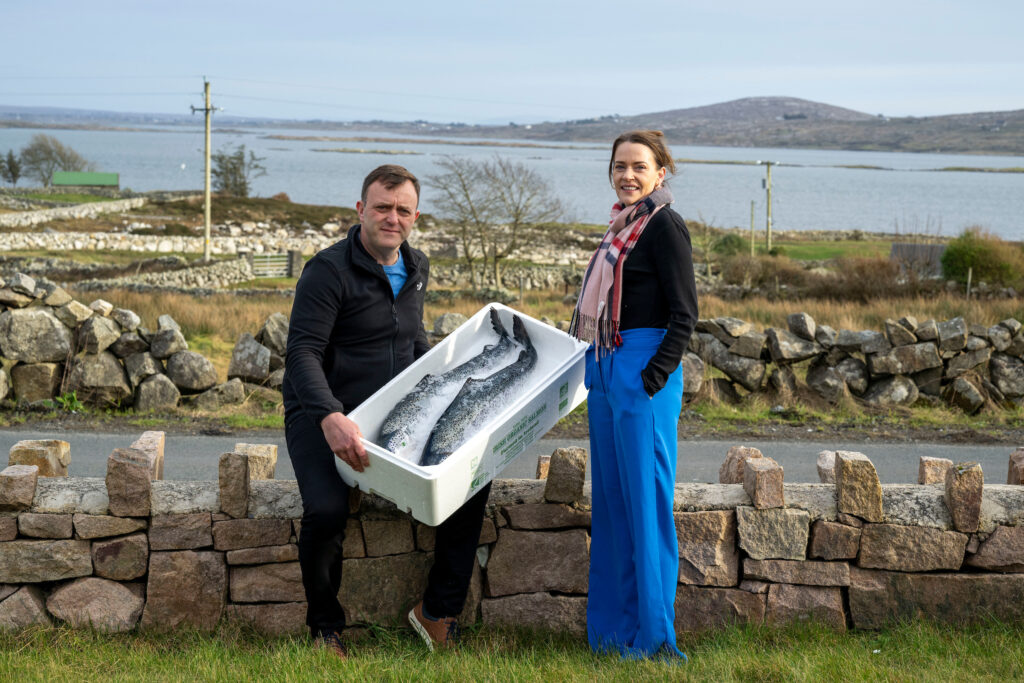The West’s awake with top quality organic salmon following €543,000 investment in Connemara seafood company

Photo:Andrew Downes, XPOSURE
Located in an untamed, scenic part of the West of Ireland, the Irish Seafood Producers Group (ISPG) has been processing and supplying the best of organic Irish salmon in the heart of the Wild Atlantic Way for well over three decades.
The group’s headquarters is based along rugged and unspoilt coastline in the village of Kilkieran, one hour west of Galway in the Connemara Gaeltacht, an area that boasts pure waters which make it an ideal habitat for fresh organic salmon.
The production arm of ISPG is Cill Chiaráin Éisc Teoranta (CCET) which was established in 1988 and currently gives employment to around 30 local people, eight of those full time all year round.
“We are very proud of what we do here” according to Bridie Casey, Financial Controller with CCET. “ISPG is one of Ireland’s leading suppliers of organic salmon farmed at sea. We were established in 1986 by a group of artisan farmers producing a relatively small quantity of Irish salmon. From humble beginnings, it has grown to become Ireland’s most reputable supplier of organic salmon with a strong reputation worldwide.”
“With the natural resource of the Atlantic Ocean on our doorstep, we pride ourselves on the quality and freshness of all our premium products. Our careful selection processes ensure that only fish of the highest quality is packed and distributed to our customers mainly in Switzerland and France.”
All CCET salmon farm suppliers adhere to rigorous organic standards. “Our approach to rearing salmon gives priority to the health and welfare of the fish, to the long-term protection of the environment and delivery of an outstanding product to the consumer. ISPG and its producers maintain the highest environmental and sustainable standards, using the most advanced technology to protect our environment and improve efficiency,” said Bridie.
According to Bridie supply of organic salmon has been a challenge in recent years. Currently salmon is being supplied to CCET by three local producers, Mannin Bay Salmon Limited, Curraun Fisheries Ltd and Bradán Beo Teo, who between them provide an average of 100 tonnes of salmon a week. All three companies maintain the highest possible organic
standards throughout the salmon’s growing cycle, from egg to harvest. The have a 51% stake in CCET.
As part of its commitment to increasing quality and efficiency, and upscaling production of value-added products CCET has just finished a €543,000 investment, of which €272,400 was grant aided under the Brexit Process Capital Support Scheme recommended by the Seafood Taskforce established by Minister for Agriculture, Food and the Marine, Charlie McConalogue T.D. and implemented by Bord Iascaigh Mhara (BIM). The scheme is funded by the European Union under the Brexit Adjustment Reserve.
“Without the support of BIM and the Brexit grant we would not have been in a position to undertake this investment. This has been massive for us, and has helped futureproof our operations and protect local jobs.” said Bridie.
The substantial investment has transformed CCET’s operations. Not only does it allow for more quality and efficiency on the production line, but it has increased output of value- added products, for which there is increasing demand. Bottlenecks in production have also been reduced.
The development saw the addition of automated portion, skinning and strapping machines which have added to efficiency by speeding up production on the factory floor and reducing costs.
The automated portioning machine in particular has cut down on the long hours it used to take to portion fish manually. This often meant the factory needed to open a second day to finish off orders for customers, incurring wash down and shut down costs, and start-up costs the following day.
“The investment also includes a new temperature control which means salmon can be stored longer in the plant allowing producers to schedule harvesting in a more efficient manner and reduce lost harvesting days due to bad weather. “
Said Bridie: “We are very excited about the energy efficiencies. Everything now is geared towards being sustainable and our ambition is to cut down on our carbon footprint and to one day be carbon neutral.”


